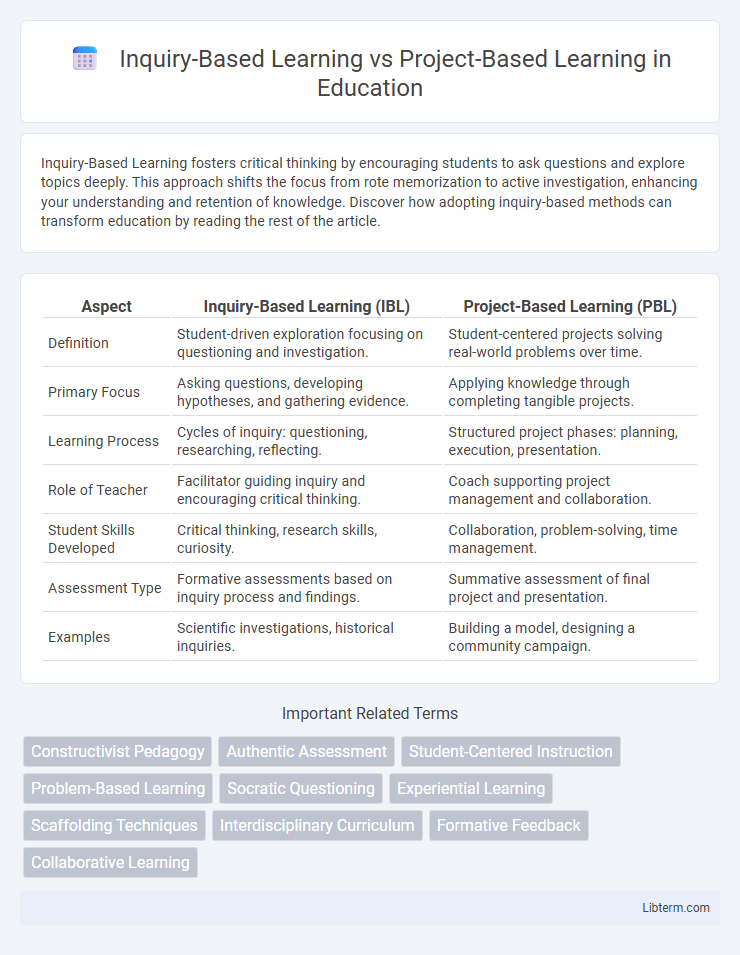Inquiry-Based Learning fosters critical thinking by encouraging students to ask questions and explore topics deeply. This approach shifts the focus from rote memorization to active investigation, enhancing your understanding and retention of knowledge. Discover how adopting inquiry-based methods can transform education by reading the rest of the article.
Table of Comparison
| Aspect | Inquiry-Based Learning (IBL) | Project-Based Learning (PBL) |
|---|---|---|
| Definition | Student-driven exploration focusing on questioning and investigation. | Student-centered projects solving real-world problems over time. |
| Primary Focus | Asking questions, developing hypotheses, and gathering evidence. | Applying knowledge through completing tangible projects. |
| Learning Process | Cycles of inquiry: questioning, researching, reflecting. | Structured project phases: planning, execution, presentation. |
| Role of Teacher | Facilitator guiding inquiry and encouraging critical thinking. | Coach supporting project management and collaboration. |
| Student Skills Developed | Critical thinking, research skills, curiosity. | Collaboration, problem-solving, time management. |
| Assessment Type | Formative assessments based on inquiry process and findings. | Summative assessment of final project and presentation. |
| Examples | Scientific investigations, historical inquiries. | Building a model, designing a community campaign. |
Introduction to Inquiry-Based and Project-Based Learning
Inquiry-Based Learning emphasizes student-driven questioning, exploration, and investigation to build deep understanding and critical thinking skills. Project-Based Learning centers on completing complex, real-world projects that require collaboration, problem-solving, and applied knowledge over extended periods. Both approaches foster active learning but differ in structure, with inquiry focusing on curiosity and questioning, while project-based learning targets tangible outcomes and interdisciplinary integration.
Key Principles of Inquiry-Based Learning
Inquiry-Based Learning centers on student-driven questioning, exploration, and critical thinking, promoting deeper understanding through active investigation and reflection. It emphasizes the development of inquiry skills such as formulating questions, conducting research, analyzing evidence, and drawing conclusions. This approach contrasts with Project-Based Learning by focusing more on the process of inquiry rather than solely on the creation of a final product.
Core Elements of Project-Based Learning
Project-Based Learning emphasizes real-world relevance, student-driven inquiry, and collaborative problem-solving, integrating a challenging project that requires sustained investigation over time. Key elements include a meaningful driving question, student autonomy, reflection, critique and revision processes, and public product presentation. This approach fosters deeper understanding by connecting learning to tangible outcomes and authentic audience engagement.
Differences in Learning Objectives
Inquiry-Based Learning emphasizes developing critical thinking and problem-solving skills by encouraging students to ask questions and explore concepts deeply. Project-Based Learning targets the application of knowledge through the creation of tangible products or presentations, fostering collaboration and real-world problem-solving. The key difference lies in Inquiry-Based Learning's focus on the inquiry process itself, while Project-Based Learning centers on producing a final project that demonstrates understanding.
Student Engagement and Motivation
Inquiry-Based Learning fosters student engagement by encouraging curiosity and critical thinking, enabling learners to explore questions deeply and develop intrinsic motivation through discovery. Project-Based Learning enhances motivation by providing real-world contexts and tangible outcomes, which support collaboration and active problem-solving. Both methods effectively increase student engagement by promoting autonomy and hands-on involvement, though Inquiry-Based Learning emphasizes questioning processes, while Project-Based Learning centers on task completion.
Teacher Roles and Guidance
Inquiry-Based Learning positions teachers as facilitators who guide students through questioning, exploration, and critical thinking, encouraging autonomy in discovering knowledge. Project-Based Learning requires teachers to act as planners and mentors, structuring real-world projects while providing scaffolding and feedback to ensure goal-oriented progress. Both approaches demand adaptive teacher roles that balance support with fostering independent problem-solving skills.
Assessment and Evaluation Methods
Inquiry-Based Learning employs formative assessments emphasizing critical thinking and problem-solving skills through ongoing questioning and reflection. Project-Based Learning utilizes summative evaluations centered on the completion and presentation of tangible projects, assessing collaboration, creativity, and application of knowledge. Both approaches incorporate rubrics and peer assessments to measure student understanding and skill development effectively.
Real-World Application and Relevance
Inquiry-Based Learning emphasizes developing critical thinking and problem-solving skills through exploring questions and scenarios rooted in real-world contexts, fostering deeper understanding and curiosity-driven discovery. Project-Based Learning centers on creating tangible projects that address authentic challenges, promoting practical application of knowledge and collaboration aligned with real-life tasks. Both approaches enhance relevance by connecting academic content to everyday experiences, preparing learners for impactful participation in their communities and careers.
Challenges and Limitations of Each Approach
Inquiry-Based Learning faces challenges such as the need for strong teacher facilitation to guide student questions effectively and the difficulty students may have in structuring open-ended investigations without clear outcomes. Project-Based Learning often encounters limitations including time constraints, resource availability, and the risk of projects becoming too broad or unfocused, which can hinder deep understanding. Both approaches require careful planning to balance student autonomy with sufficient support to maximize learning outcomes.
Choosing the Right Approach for Your Classroom
Inquiry-Based Learning fosters critical thinking by encouraging students to ask questions and explore concepts deeply, making it ideal for classrooms aiming to develop analytical skills. Project-Based Learning emphasizes hands-on, real-world problem solving, suitable for environments where collaboration and practical application are prioritized. Selecting the right approach depends on curriculum goals, student needs, and the desired balance between investigation and active creation.
Inquiry-Based Learning Infographic

 libterm.com
libterm.com